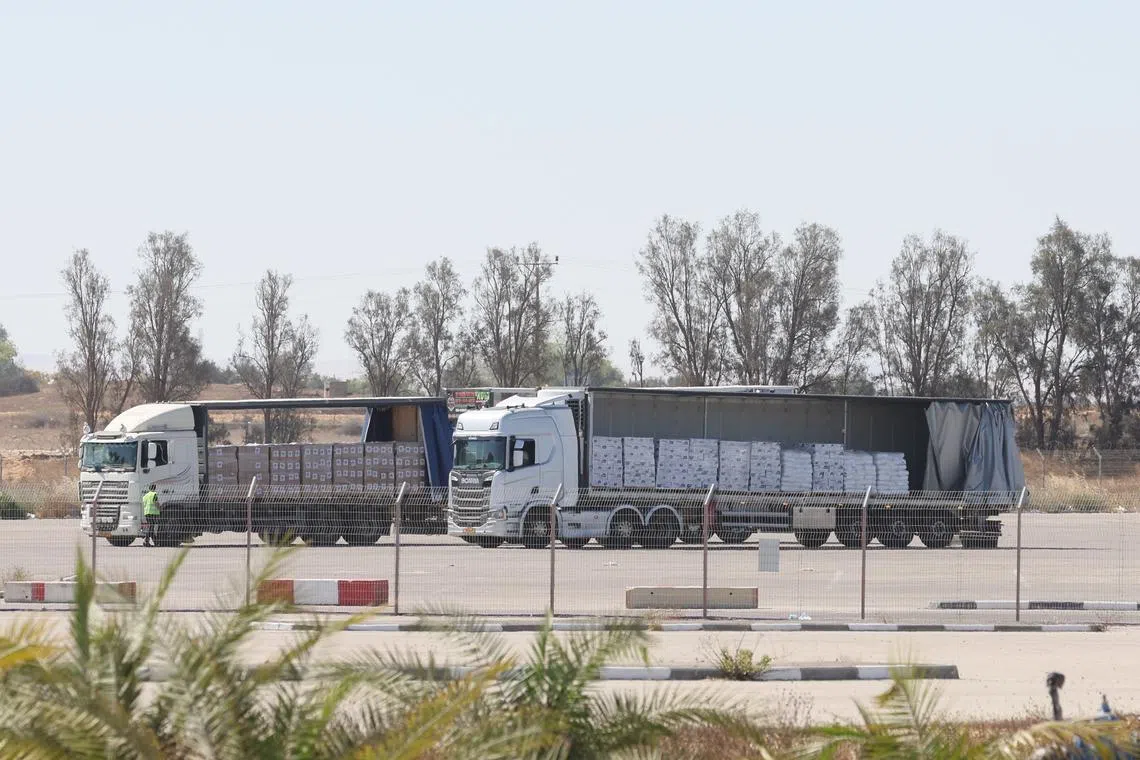US-backed Gaza group suspends aid for a day over threats; Hamas vows to protect UN aid
Sign up now: Get ST's newsletters delivered to your inbox

Palestinian children gathering at a hot meal distribution point in Nuseirat in the central Gaza Strip on June 4.
PHOTO: AFP
Follow topic:
JERUSALEM/CAIRO - A controversial humanitarian organisation backed by the US and Israel did not distribute any food aid on June 7, accusing Hamas of making threats that “made it impossible” to operate in the enclave, which the Palestinian militants denied.
The Gaza Humanitarian Foundation (GHF), which uses private US security and logistics firms to operate, said it was adapting operations to overcome the unspecified threats. It later said in a Facebook post that two sites would reopen on June 8.
A Hamas official told Reuters he had no knowledge of such “alleged threats”.
The Hamas-run Gaza government media office said later on June 7 that the GHF operation has “utterly failed on all levels” and that Hamas was ready to help secure aid deliveries by a separate long-running United Nations-led humanitarian operation. Hamas also called on all Palestinians to protect humanitarian convoys.
Israel and the US have accused Hamas of stealing aid from the UN-led operations, which the militants deny.
A Hamas source said the group’s armed wing would deploy some snipers from June 8 near routes used by the UN-led aid operation to prevent armed gangs looting food shipments. The UN did not immediately respond to a request for comment.
Israel allowed limited UN-led operations to resume on May 19 after an 11-week blockade
The UN has described the aid allowed into Gaza as a “drop in the ocean”.
Israel and the US are urging the UN to work through the GHF, but the UN has refused, questioning its neutrality and accusing the distribution model of militarising aid and forcing displacement.
The GHF began operations in Gaza on May 26 and said on June 6 that so far, it has distributed nearly nine million meals.
While the GHF has said there have been no incidents at its so-called secure distribution sites, Palestinians seeking aid have described disorder and access routes to the sites have been beset by chaos and deadly violence.
Dozens of Palestinians were killed near GHF sites between June 1 and June 3, the Gaza health authorities said.
Israel has said it is investigating the incidents on June 2 and June 3, but said it was not to blame for the June 1 violence.
Hospital fuel low
The GHF did not give out aid on June 4 as it pressed Israel to boost civilian safety beyond its sites, then on June 6 it paused some aid distribution “due to excessive crowding”.
The Israeli military said on June 7 that 350 trucks of humanitarian aid belonging to the UN and other international relief groups were transferred during the week via the Kerem Shalom crossing into Gaza.
Israel makes the UN offload aid on the Palestinian side of the crossing, where it then has to be picked up by the UN and aid groups in Gaza.
The UN has accused Israel of regularly denying access requests and complained that its aid convoys have been looted by unidentified armed men and hungry civilians.

Trucks with humanitarian aid bound for Gaza at the Kerem Shalom crossing on the Gaza-Israel border on May 29.
PHOTO: EPA-EFE
Israel has in recent weeks expanded its offensive across the Gaza Strip as US, Qatari and Egyptian-led efforts to secure another ceasefire have faltered.
Medics in Gaza said 55 people were killed in Israeli strikes across the enclave on June 7.
The Palestinian Health Ministry said on June 7 that Gaza’s hospitals had fuel for only three more days, and that Israel was denying access for international relief agencies to areas where fuel storages designated for hospitals are located.
There was no immediate response from the Israeli military or Cogat, the Israeli defence agency that coordinates humanitarian matters with the Palestinians.
Meanwhile, the Israeli military said it had uncovered “an underground tunnel route, including a command and control centre from which senior Hamas commanders” operated beneath the European Hospital compound in southern Gaza.
The war erupted after Hamas-led militants took 251 hostages and killed 1,200 people, most of them civilians, in an Oct 7, 2023 attack, Israel’s single deadliest day.
Israel’s military campaign has since killed more than 54,000 Palestinians, most of them civilians, according to the health authorities in Gaza, and flattened much of the coastal enclave.
Israeli Defence Minister Israel Katz said on June 7 the Israeli military had retrieved the body of a Thai agricultural worker held in Gaza since the October 2023 attack.
Mr Nattapong Pinta’s body was held by the Mujahedeen Brigades militant group, and recovered from Rafah in southern Gaza, Mr Katz said. REUTERS

